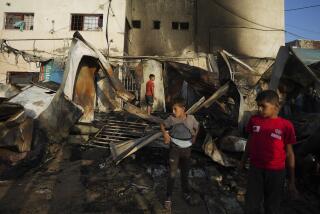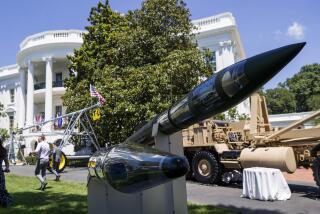U.S. to Expand Relief for Kurds : Refugees: The plan calls for feeding and sheltering as many as 700,000. The effort could lead to the first deployment of Americans in northern Iraq.
WASHINGTON — The Bush Administration revealed plans Thursday for a major expansion of relief efforts for beleaguered Kurdish refugees, a move that could lead to the first deployment of U.S. personnel into northern Iraq.
As the Administration scrambled to counter criticism that it has been slow to help the Kurds, President Bush insisted that he is in “total agreement” with European allies on what steps to take. The new plans call for setting up a relief effort capable of feeding and sheltering as many as 700,000 people who have fled Saddam Hussein’s forces.
“We are going forward to give relief to these people where they are, and we are going to continue to do that, and we do not expect any interference from the man in Baghdad. And he knows better than to interfere,” Bush told reporters after meeting with top European Community officials.
“And, P.S., I am not going to involve any American troops in a civil war in Iraq,” Bush added. “I want these kids to come home, and that’s what’s going to happen.”
Administration officials, however, said they could not rule out the possibility that U.S. military forces might be required to escort relief supplies from Turkey into Iraq or move into the northern part of the country to help maintain order.
American and allied forces also have developed contingency plans if Hussein’s regime should ignore U.S. warnings--first made over the weekend and repeated Wednesday--that proclaimed the strip of northern Iraq above the 36th Parallel to be a haven for the Kurds.
So far, no U.S. personnel have been deployed in northern Iraq, where Hussein’s forces have used military force to suppress Kurdish uprisings. American units that took part in Operation Desert Storm currently occupy part of southern Iraq below the Euphrates River.
Some U.S. forces also are stationed in Turkey, where the United States has maintained a military presence for years, but those units have not ventured into northern Iraq.
“There’s no intention to cross the border,” a White House official said, adding that plans call for U.S. personnel to stay on the Turkish side of the border, while leaving all operations inside Iraq to Turks and other contract employees.
But U.S. officials conceded that their plans could break down because of the chaotic border situation, particularly if Hussein’s forces try to attack the refugees.
“There are forces there that are capable of taking action to carry out the warning that we have given to Iraq,” White House Press Secretary Marlin Fitzwater said. Such action, he insisted, would not violate Bush’s promise to avoid becoming entangled in a civil war.
“American soldiers are not going to die trying to sort out the government in Baghdad,” he said. “But on the other hand, we are going to help the refugees. . . . They are two distinct matters.”
The aid effort also could lead to greater U.S. involvement with Iran, which borders Iraq to the east and which has accepted tens of thousands of Kurdish refugees.
Tehran has notified Washington that it will accept American help funneled through international agencies, State Department spokesman Richard Boucher said. “In public statements, Iran has now made clear . . . willingness to accept international assistance for refugees located inside Iran,” he said. “Iran has also announced that (its) airspace will be open to relief flights bringing humanitarian assistance to the refugees.”
So far, Hussein’s forces have made no move to interfere with the relief efforts inside Iraq. But sporadic fighting within the country continues, U.S. officials said, citing heavy fighting Thursday between loyalist forces and Kurdish rebels in the vicinity of the oil-producing town of Kirkuk, about 40 miles south of the protected zone.
There also have been reports of Kurdish rebel groups using the safe haven north of the 36th Parallel as a sanctuary from which to attack Hussein’s forces. U.S. officials repeatedly have refused to say whether they have tried to restrain such Kurdish attacks.
Currently, the main military forces in the region are Turkish troops that crossed the border several days ago. The Turks “are there essentially on a humanitarian mission to protect the displaced persons, maintain order and assist in the relief effort,” Boucher said.
As the expanded relief operation unfolds on Iraq’s northern frontier, American commanders are preparing to pull out the remaining U.S. forces still occupying a large part of southern Iraq.
Overall, U.S. troop strength in the Persian Gulf region is now down to 316,000, from a peak of 540,000, according to the U.S. Central Command. And of the roughly 100,000 American troops who once occupied southern Iraq, the majority are now on their way home.
But at least some American troops will remain in southern Iraq for an extended period. Fitzwater confirmed widespread reports that Bush had offered a small number of American soldiers to be part of the U.N. peacekeeping force that will monitor a demilitarized zone along Iraq’s border with Kuwait.
The lightly armed U.N. force will be responsible for guarding the border and for protecting the thousands of refugees who have flocked to the U.S.-controlled area of Iraq for shelter from Hussein’s troops. A camp for 6,000 refugees has been established within the U.N. zone, but many refugees remain fearful of what might happen to them when the American troops pull back.
U.S. military forces in southern Iraq have provided more than 500,000 meals and 1 million gallons of water to refugees in the occupied area and continue to feed 27,000 to 30,000 people a day, Fitzwater said.
In northern Iraq, the Administration’s original plan called for airdrops of supplies and the establishment of refugee centers within Turkey to cope with the thousands of refugees crossing the border.
But with Turkey balking at accepting a flood of refugees, European leaders began pushing for creation of a protected “enclave” inside Iraq. In response, the Administration widened its plan, which now focuses on establishing refugee centers and supply depots inside Iraq itself.
Bush advisers estimate that the refugee crisis will continue well into the summer, but they hope to be able to turn the entire logistic effort over to international relief organizations by May.
“The President has directed that no effort be spared to help the refugees and has authorized all the resources necessary to sustain this commitment until international organizations can take over,” Fitzwater said.
Fitzwater rejected charges that the Administration had been slow to respond to the refugee crisis, saying that Bush feels “frustration” at not being able to do more faster.
The effort on the ground will dwarf the aid that has been supplied so far from the air--216 tons of food, water and other supplies dropped into northern Iraq by C-130 cargo planes--even though the air drops already have become what Fitzwater called the “largest U.S. relief effort mounted in modern military history.”
In addition to the U.S. efforts, British military flights have dropped 74.1 tons, and French transports have delivered 44.9 tons, Pentagon spokesman Pete Williams said.
The airdrops are expected to continue for about another week until the land-based effort has been organized. “We’re ready every day to fly more supplies than we flew the day before. And that general trend toward increasing the amount of supplies being provided will continue to grow,” said Williams.
Williams said that Air Force EF-111 fighter-bombers and F-16 fighters are escorting the transport flights and will enforce the Administration’s warning to Iraq not to interfere with the relief efforts.
The relief project, dubbed Operation Provide Comfort, is being run by the military’s European Command, under Gen. John Galvin, rather than by Gen. H. Norman Schwarzkopf’s Central Command, because Turkey is a North Atlantic Treaty Organization member and falls into the European area of operations.
Under current plans, U.S. civilian and military personnel in Turkey will establish supply depots and organize truck convoys to carry tons of food and other supplies across eastern Turkey and into northern Iraq. Already, about 3,500 tons of supplies are headed to Turkish ports aboard U.S. military supply ships and American officials--joined by British, French and other Europeans--are seeking to buy thousands of pounds of beans and rice on the Turkish market to send to the refugees.
American military medical personnel recently deployed in Saudi Arabia and Kuwait also are being transferred to Turkey to help with the medical problems of the refugees.
The cost of the relief operation is climbing steadily. White House officials declined to put an overall price tag on the effort, but Boucher said that U.S. relief efforts already had cost about $53 million this year.
In addition, he said, the United Nations plans an emergency appeal for between $450 million and $500 million to help what could be as many as 1.7 million displaced Iraqis.
At the United Nations, meanwhile, Secretary General Javier Perez de Cuellar received a letter from Iran’s Foreign Minister Ali Akbar Velayati on Thursday describing the dimensions of the refugee crisis and adding, “The magnitude of the disaster requires immediate action by the United Nations.”
Velayati said that about 900,000 Iraqis had crossed into his country, a flood that “surpassed all estimates and preparations.’
In Geneva, the United Nations released an updated plan for humanitarian action in the Persian Gulf region. It estimated that the number of refugees in the region could rise to 1.5 million, with 1 million seeking refuge in Iran and half a million in Turkey.
Times staff writers Melissa Healy and Norman Kempster in Washington and John Goldman at the United Nations contributed to this report.
More to Read
Sign up for Essential California
The most important California stories and recommendations in your inbox every morning.
You may occasionally receive promotional content from the Los Angeles Times.











